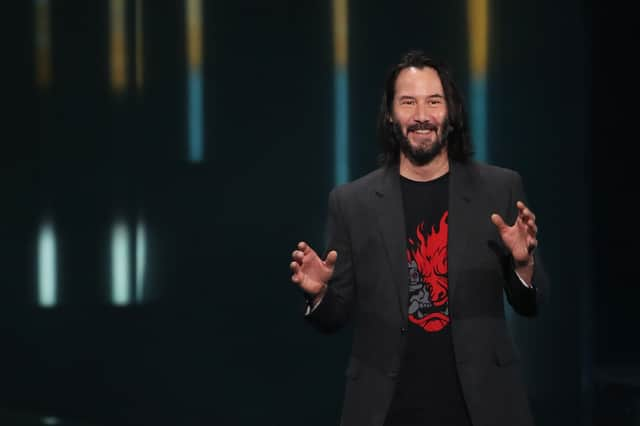As the use of deepfakes rise, Keanu Reeves denounces the practice; ‘you lose your agency.’
People in this article
This article contains affiliate links. We may earn a small commission on items purchased through this article, but that does not affect our editorial judgement.


Deepfakes have started to become more commonplace in Hollywood, with Elvis Presley the latest celebrity to have his likeness programmed into AI software to become 'present' during America’s Got Talent in 2022. While more actors are starting to sign the image rights away as a means of making that extra bit of money, the internet’s favourite actor Keanu Reeves is vehemently against the concept.
"When you give a performance in a film, you know you’re going to be edited, but you’re participating in that," he explained to WIRED during an interview ahead of the release of John Wick: Chapter 4. "If you go into deepfake land, it has none of your points of view. That’s scary. It’s going to be interesting to see how humans deal with these technologies. They’re having such cultural, sociological impacts, and the species is being studied. There’s so much ‘data’ on behaviors now."
Advertisement
Hide AdAdvertisement
Hide AdReeves’ concern regarding the use of technology in the acting world was compounded during a conversation he had with a 15-year-old regarding the fundamental narrative of The Matrix movies. When Reeves explained that his character, Neo, was fighting for what’s real, the teenager retorted to the star simply uttering "Who cares if it’s real?"
"It’s cool, like, look what the cute machines can make! But there’s a corporatocracy behind it that’s looking to control those things", he continued. "Culturally, socially, we’re gonna be confronted by the value of real, or the non-value. And then what’s going to be pushed on us? What’s going to be presented to us?"
While digital editing in post-production became a mainstay in the late ‘80s, Reeves also revealed in his interview that he has a clause in his contract to prevent edits to his performances from being made. "Yeah, digitally. I don’t mind if someone takes a blink out during an edit."
"But early on, in the early 2000s, or it might have been the ’90s, I had a performance changed. They added a tear to my face, and I was just like, ‘Huh?!’ It was like, I don’t even have to be here." It would explain then why Reeves was so hands on with his involvement in the video game Cyberpunk 2077, in which the actor both provided the voice and motion capture for one of the characters.
Advertisement
Hide AdAdvertisement
Hide AdAre deepfakes the cinema equivalent of musicians selling their catalogue?
Despite Keanu Reeves' trepidation regarding the use of AI and deepfakes, for other performers, it’s become another source of revenue without having to undertake the prolonged production process. Is this then the acting world’s version of the current trend for musicians to sell their back catalogue and licence their image more ubiquitously?
Having discussed the rise of musicians selling their back catalogue for large sums of money, be it for a large cash injection compared to streaming royalties or just wanting to slow down in their older age, the same could be said now for actors/actresses.
In 2022, James Earl Jones reportedly “signed off” on his voice being deepfaked for future movies in the Star Wars franchise; however rather than selling his likeness outright, the actor still retained a level of agency by ensuring that the AI voiceover was used in a manner it would not paint him in a dim light.
Bruce Willis also was involved in the use of AI late last year, when Deepcake struck a deal that allowed the company to map a digital version of his appearance onto another actor in a commercial for the Russian cell network Megafon. However, his voice likeness was left to a voice-over actor instead.
Advertisement
Hide AdAdvertisement
Hide AdWhile Keanu’s point does resonate, especially with the concerns over how deepfakes could be used to create a newer wave of misinformation and obfuscating in political theatre, artists selling their likenesses for endorsement deals is nothing new - but with technology advancing how it has and deepfakes becoming normalised, who will be the first living performer to sell their image rights in full?
Comment Guidelines
National World encourages reader discussion on our stories. User feedback, insights and back-and-forth exchanges add a rich layer of context to reporting. Please review our Community Guidelines before commenting.
